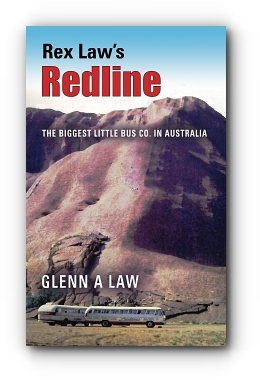| ||||||||||||||||
| Category: Transportation |
(requires Adobe Reader)
|
| About the Book | |
|
The book describes the industry’s burgeoning post-WW2 history and recounts events and circumstances now lost in time, likely never to be repeated. For example, no other national road passenger carrier, before or since, has emulated the independent long-term concurrent operation of scheduled packaged tours and express services into every state and territory of the Commonwealth of Australia by the two arch rivals, Rex Law's Redline and Reg Ansett's Pioneer. While Reg Ansett’s business interests expanded broadly and rapidly, he achieved this only by relinquishing massive portions of personal ownership through the sale of shares to directors, investment institutions and the public. Rex’s approach was different; therefore, when he received an enormous walk-in/walk-out cash buyout offer in 1965, the destiny of the business rested in his hands alone. History records he declined this and other offers, including at least one from Reg Ansett. The nexus between the new Australian road passenger industry and commercial passenger aviation is also discussed via several entities who participated in both fields. Rex and the author had planned to join this exclusive club with their “Centralian Skyliners” initiative, which is described as the narrative unfolds. During the fifteen years between 1954 and 1969, Rex Law placed build orders with most established Queensland coach builders, plus at least two located interstate. Further, during the late 1950s, he backed two local start-up ventures, one of which didn’t succeed, resulting in a considerable financial drain on the Law coffers. The other entity became an enormous success, constructing more than fifty coaches for Redline. The book also highlights the powerful influence Rex Law exerted on the future design parameters of locally constructed buses and coaches. In recognition of his stature within the industry, Leyland Motors engaged with him on a unique project that confirmed this fact. They provided full warranty-backed approval of his proposal to rear-engine modify and assemble a large tranche of brand new completely knocked down (CKD) copies of Leyland’s Albion Viking VK41L chassis model at Redline’s West End, Brisbane workshops. Rex became a steadfast supporter of disadvantaged Australian children through Redline’s meaningful support for the Miss Australia Quest, the national charitable fundraising vehicle associated with the Cerebral Palsy Association of Australia. The very personal reasons behind this are disclosed. Redline would unfortunately succumb to a relentless sequence of adverse circumstances and influences, entirely unrelated to any competitive pressures exerted by Pioneer. Reg Ansett received a knighthood for his services to the transport industry in the same year that Rex Law was facing the loss of the fruits of his life’s work. Ironically, within a few years, Sir Reginald also tragically lost his entire business, the circumstances of which being described as the memoir unfolds. Rex continued beyond his great Redline adventure without excuse or complaint, making the most of his remaining blessings while, as always, thinking and acting more with his heart than his head.
|
|
| Reviews | |
Brings back a lot of fond memories of Redline (Rex Law and the Bus Industry, especially all the photos) The preface is good to set the scene for covering other companies, quote " I have broadened the narrative." The research to cover so many interesting points is commendable and the read flows well. Chapter 27 - "1970" is very sad, but confirms your wish that the book would cover Rex Law's Redline "as it was." The appendices "A to G" give a good final lift to the end. All the best to you and your book. Kindest regards.
|
|
| About the Author | |
 |
The author, aged 76 years, is the second son of the principal character in the book, "Rex Law's Redline: The Biggest Little Bus Co in Australia." Glenn was born in July 1943 and was raised with his older brother Grant, in Brisbane, Australia. |

